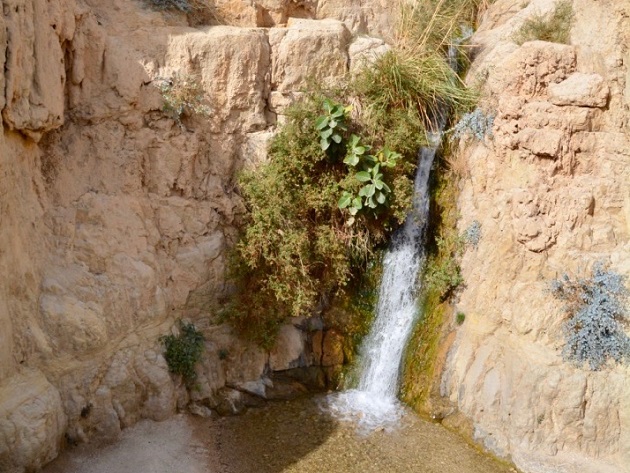The En Gedi oasis
Henna is only referred to twice in the Song of Songs (chapter 1:14 and 4:13), in relation to beauty, fragrance and love.
11 FEBRUARY 2018 · 11:00 CET

My beloved is to me a cluster of henna blossoms from the vineyards of En Gedi. Song of songs ch. 1:14
The Henna plant (ligustrum vulgare) is a bush that grows to a height of 2 to 3 metres (occasionally up to 5). Also known as wild privet in English, the plant belongs to the oleaceae family. It has very supple branches and dark green leathery leaves, not unlike those of the olive tree.
Its flowers form clusters made up of small white blossoms, and give off a pleasantly sweet fragrance. Each blossom has only two stamens. The fruit consists of small black berries, about three millimetres in diameter, which, as they contain small amounts of arsenic, are bitter and poisonous.
Despite this, they have been known since ancient times to have many medicinal applications (cataplasms for rashes, burns and headaches, and also dyes for hair, etc.)
It is native to Asia and Europe, where it thrives especially in humid forests, and is used in gardening to make hedges or fences. The leaves can be dried and crushed to produce a reddish dye known as henna, which is used as hair-dye. Some oriental women also make paint with it for their hands and feet, a technique known as mehndi
Henna is only referred to twice in the Song of Songs (chapter 1:14 and 4:13), in relation to beauty, fragrance and love. It was a very common plant in Palestine and, generally speaking, it was highly appreciated in the East, especially on account of its fragrance.
The En Gedi oasis, mentioned in the texts quoted above, was also known as the "Goat Springs", or the "Wild Goat Springs", belonged to the tribe of Judah (Joshua 15:62), and was where David took refuge when he was being hunted down by Saul (1 Samuel 24:1). It was a place of refreshment for wayfarers crossing the desert next to the Dead Sea as it had a permanent spring of water and a beautiful waterfall which it is still possible to visit today. It was home to a vast array of plants from which perfumes and cosmetics were obtained.
The beloved featured in the Song of Songs returns her lovers compliments with the images that she knew best: a bunch of henna flowers from the En Gedi vineyards. A good way of expressing love is to speak well of the beloved using beautiful words or lovely, deeply-felt similes and examples which spring from the mind, but also from the heart.
Published in: Evangelical Focus - Zoe - The En Gedi oasis












